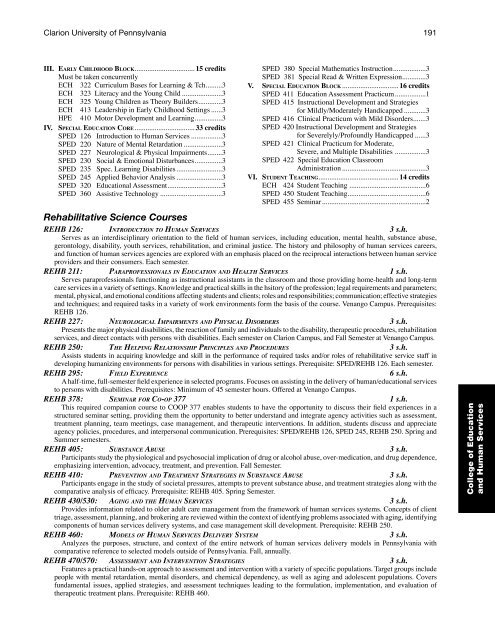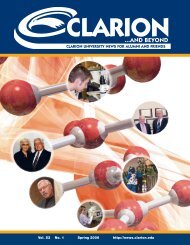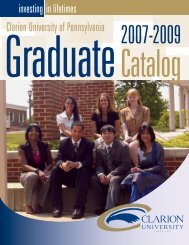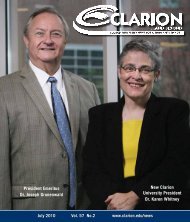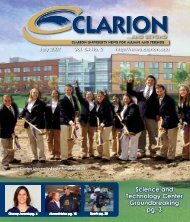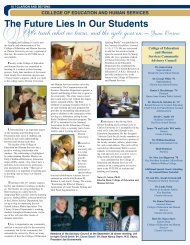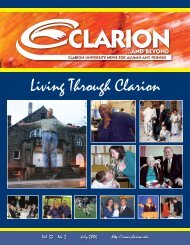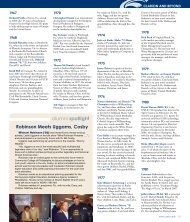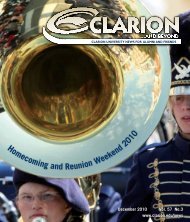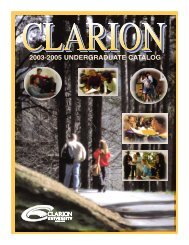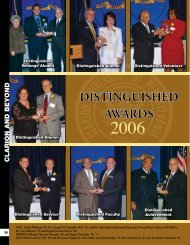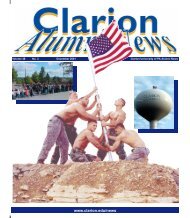Undergraduate - Clarion University
Undergraduate - Clarion University
Undergraduate - Clarion University
- No tags were found...
Create successful ePaper yourself
Turn your PDF publications into a flip-book with our unique Google optimized e-Paper software.
<strong>Clarion</strong> <strong>University</strong> of Pennsylvania 191III. Early Childhood Block................................. 15 creditsMust be taken concurrentlyECH 322 Curriculum Bases for Learning & Tch.........3ECH 323 Literacy and the Young Child.......................3ECH 325 Young Children as Theory Builders.............3ECH 413 Leadership in Early Childhood Settings.......3HPE 410 Motor Development and Learning...............3IV. Special Education Core.................................. 33 creditsSPED 126 Introduction to Human Services..................3SPED 220 Nature of Mental Retardation......................3SPED 227 Neurological & Physical Impairments........3SPED 230 Social & Emotional Disturbances...............3SPED 235 Spec. Learning Disabilities..........................3SPED 245 Applied Behavior Analysis..........................3SPED 320 Educational Assessment..............................3SPED 360 Assistive Technology...................................3SPED 380 Special Mathematics Instruction..................3SPED 381 Special Read & Written Expression.............3V. Special Education Block................................ 16 creditsSPED 411 Education Assessment Practicum..................1SPED 415 Instructional Development and Strategiesfor Mildly/Moderately Handicapped.............3SPED 416 Clinical Practicum with Mild Disorders.......3SPED 420 Instructional Development and Strategiesfor Severelyly/Profoundly Handicapped.......3SPED 421 Clinical Practicum for Moderate,Severe, and Multiple Disabilities .................3SPED 422 Special Education ClassroomAdministration...............................................3VI. Student Teaching............................................ 14 creditsECH 424 Student Teaching ..........................................6SPED 450 Student Teaching...........................................6SPED 455 Seminar..........................................................2Rehabilitative Science CoursesREHB 126: Introduction to Human Services 3 s.h.Serves as an interdisciplinary orientation to the field of human services, including education, mental health, substance abuse,gerontology, disability, youth services, rehabilitation, and criminal justice. The history and philosophy of human services careers,and function of human services agencies are explored with an emphasis placed on the reciprocal interactions between human serviceproviders and their consumers. Each semester.REHB 211: Paraprofessionals in Education and Health Services 1 s.h.Serves paraprofessionals functioning as instructional assistants in the classroom and those providing home-health and long-termcare services in a variety of settings. Knowledge and practical skills in the hsitory of the profession; legal requirements and parameters;mental, physical, and emotional conditions affecting students and clients; roles and responsibilities; communication; effective strategiesand techniques; and required tasks in a variety of work environments form the basis of the course. Venango Campus. Prerequisites:REHB 126.REHB 227: Neurological Impairments and Physical Disorders 3 s.h.Presents the major physical disabilities, the reaction of family and individuals to the disability, therapeutic procedures, rehabilitationservices, and direct contacts with persons with disabilities. Each semester on <strong>Clarion</strong> Campus, and Fall Semester at Venango Campus.REHB 250: The Helping Relationship Principles and Procedures 3 s.h.Assists students in acquiring knowledge and skill in the performance of required tasks and/or roles of rehabilitative service staff indeveloping humanizing environments for persons with disabilities in various settings. Prerequisite: SPED/REHB 126. Each semester.REHB 295: Field Experience 6 s.h.A half-time, full-semester field experience in selected programs. Focuses on assisting in the delivery of human/educational servicesto persons with disabilities. Prerequisites: Minimum of 45 semester hours. Offered at Venango Campus.REHB 378: Seminar for Co-op 377 1 s.h.This required companion course to COOP 377 enables students to have the opportunity to discuss their field experiences in astructured seminar setting, providing them the opportunity to better understand and integrate agency activities such as assessment,treatment planning, team meetings, case management, and therapeutic interventions. In addition, students discuss and appreciateagency policies, procedures, and interpersonal communication. Prerequisites: SPED/REHB 126, SPED 245, REHB 250. Spring andSummer semesters.REHB 405: Substance Abuse 3 s.h.Participants study the physiological and psychosocial implication of drug or alcohol abuse, over-medication, and drug dependence,emphasizing intervention, advocacy, treatment, and prevention. Fall Semester.REHB 410: Prevention and Treatment Strategies in Substance Abuse 3 s.h.Participants engage in the study of societal pressures, attempts to prevent substance abuse, and treatment strategies along with thecomparative analysis of efficacy. Prerequisite: REHB 405. Spring Semester.REHB 430/530: Aging and the Human Services 3 s.h.Provides information related to older adult care management from the framework of human services systems. Concepts of clienttriage, assessment, planning, and brokering are reviewed within the context of identfying problems associated with aging, identifyingcomponents of human services delivery systems, and case management skill development. Prerequisite: REHB 250.REHB 460: Models of Human Services Delivery System 3 s.h.Analyzes the purposes, structure, and context of the entire network of human services delivery models in Pennsylvania withcomparative reference to selected models outside of Pennsylvania. Fall, annually.REHB 470/570: Assessment and Intervention Strategies 3 s.h.Features a practical hands-on approach to assessment and intervention with a variety of specific populations. Target groups includepeople with mental retardation, mental disorders, and chemical dependency, as well as aging and adolescent populations. Coversfundamental issues, applied strategies, and assessment techniques leading to the formulation, implementation, and evaluation oftherapeutic treatment plans. Prerequisite: REHB 460.pages i-viiCollege of Educationand Human Services


